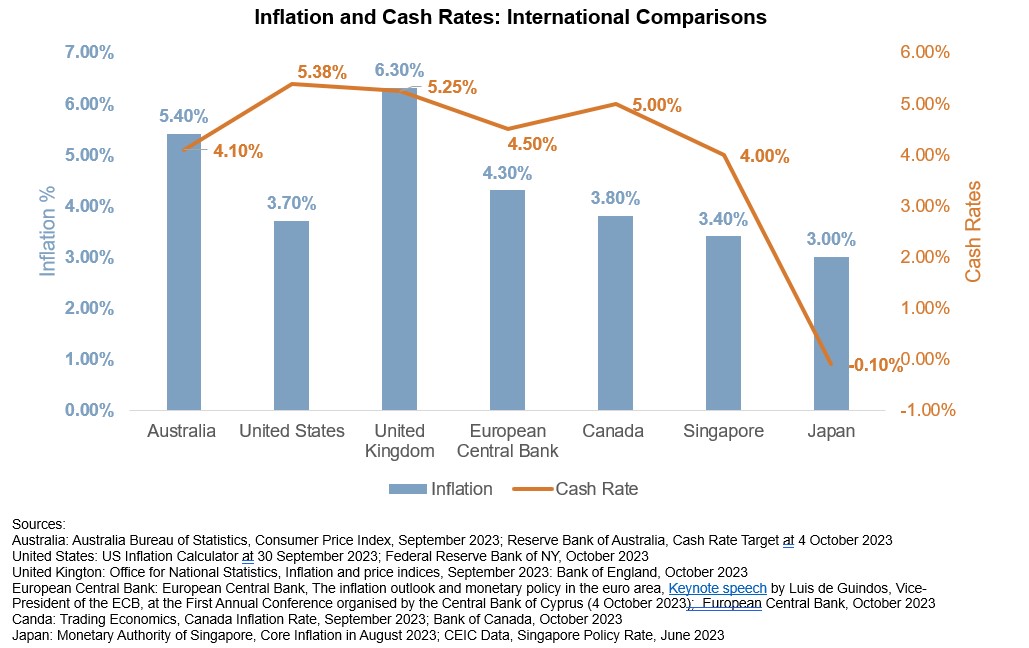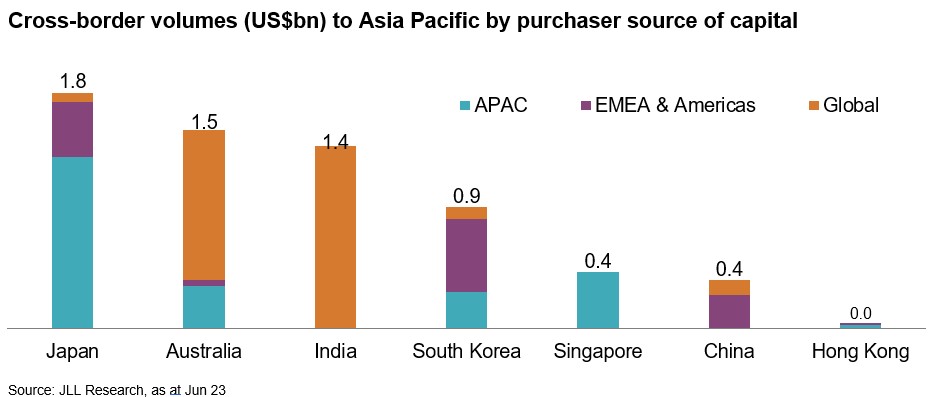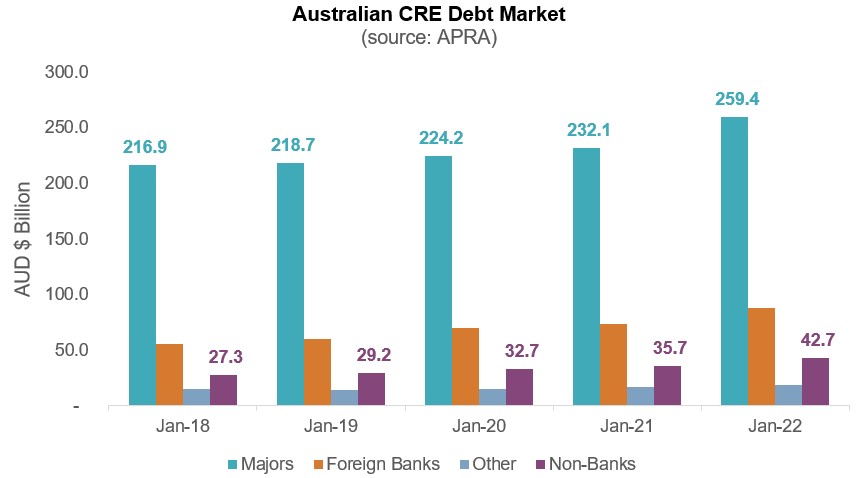The Lucky Country
Australia is described as the “lucky country” in reference to our economic opportunity and natural resources abound. This is a term coined in the 1960s by author Donald Horne, who, among other topics, honed in on our nation’s distance from neighbouring countries and their geopolitical concerns, which has enabled Australia to prosper – by lucky default rather than by design. And it’s this “luck,” we believe, international institutional investors are looking to capitalise on, among the wider global economic instability.
Let’s look at Australia in a global context. Across the world, markets are emerging with a post-pandemic economic hangover. National leaders are attempting to smother high inflation with rising cash rates – with mixed results (see chart below). Supply chain disruptions continue, hindered further by geo-political barriers– most notably trade barriers between Britain and the European Union – not to mention the harrowing wars between Russia and Ukraine and now across Gaza. In this context, Australia provides somewhat of a stable haven.
Our cash rate hikes have been steep, but in step with other nations. Though we have yet to hit the same interest rate highs experienced among some of our international peer group.

Consequently, with comparable geopolitical stability and relatively robust CRE markets, Australia presents an attractive investment opportunity. And the proof is in the pudding.
According to JLL, Australia screens favourably compared to global markets largely due to its transparent land title and political systems, access to freehold assets and expected population growth. In Q2 2023 (calendar year), Australia attracted US$1.5billion of “cross border” institutional investment into its CRE markets. Cross-border is a term referring to capital investment outside of where an institution is domiciled.

Interestingly, some of the most active APAC institutions investing in Australia recently hail from Japan. This breaks a c.30-year hiatus with Japanese institutions committing more than nominal sums into the Australian CRE market. Private equity from Mitsubishi Estates Global Partners, Daibiru, Daiwa House have invested $2.9billion[i], $315million[ii] and $488million[iii], respectively, across the office and build to rent sectors. Hong Kong-based Pacific Alliance Group also recently secured the $393million Sydney office tower at 44 Market Street while a sovereign wealth fund partnered with a local operator to form a $1billion healthcare real estate fund.
On the other side of the globe, North American private equity has also increased its appetite down under with US-based Nuveen Real Estate backing local student accommodation platform, Switch, which has a $900million platform. Likewise, Canada’s Ivanhoe Cambridge has committed $1billion to student accommodation with local operator, Scape.
As mentioned, an important aspect of this investment appetite stems from Australia’s near-term population growth. Recent and forecast population growth are anticipated to underpin a higher supply-demand imbalance, which is set to fuel domestic real estate sectors. As the charts below illustrates, Australia has one of the strongest net overseas/international migration, globally, which has created strong near-term tailwinds, especially within the residential sector.

For both migrants and investors alike, Australia’s stable political systems and market transparency are considered another appealing factor. According to the JLL and La Salle Investment Management’s Global Real Estate Transparency Index 2022, which assesses 254 indicators across 94 countries, Australia ranked fourth behind the UK (1), USA (2) and France (3). The Index is designed for cross-border real estate investors, lenders and corporate occupiers.
Looking ahead, should we continue to avoid black swan events and firm-up our onshore supply chains, then in the short to medium term Australia can expect to continue attracting international investment interest to our shores. Commercial real estate sectors we believe will continue attracting strong inbound capital include the industrial, real estate credit and agriculture.
Industrial
Industrial vacancy remains the lowest in Australia compared to other mature international markets (see graph below). We believe this presents an opportunity to further extract rental growth from the domestic market. Additionally, a significant volume of new supply has already been pre-committed, which puts further upward pressure on industrial rental values.
Research shows 71% of developments expected to be completed in 2023 are pre-committed and over the next three years there is only c.1million sqm of uncommitted supply in the pipeline. Demand is expected to be over three million square metres, which clearly means demand is forecast to exceed[iv] supply.

Real Estate Credit
In the current economic climate, traditional debt providers have tightened their lending criteria, paving the way for non-bank real estate finance to come to the fore. Domestically, the non-bank sector provides a credible and attractive solution for developers who are reacting to a nationwide housing shortage – which is compounded with an influx of new migrants. Like industrial, the Australian non-bank market is still in its infancy compared with international non-bank commercial real estate peers and we see this as a growth opportunity.
Between June 2018 and June 2022 , non-bank real estate lending in Australia increased its market share from 8.7% of all commercial real estate loans to 10.5%[v]. More specifically, the value of non-bank real estate loans in this period increased 56% to $43 billion [v].
In comparison, commercial real estate non-bank debt markets in the US enjoy a 50% market share and 35% market share across Europe (including the UK)[vi]. With limited lending options for developers and rising demand for housing, we expect domestic non-bank real estate finance to gain more market traction.

Agriculture
The connotation of dusty homesteads surrounded by herds of sheep and cattle is often synonymous with Australian iconography. However, biotechnology and precision farming advancement have assisted with a rapid rise in production efficiency and yields and Australia is, arguably, at the forefront of this sector. Already known worldwide for broadacre farming, Australian farmers have turned their hand to large-scale glasshouse production, which has increased the volume, quality and reliability of supply across various vegetables such as tomatoes, capsicums and cucumbers. This type of real estate infrastructure facilitates supply mostly to the domestic market, but also throughout the Asia Pacific region.
The latter is a market benefitting from a burgeoning middle-class. In August 2023, the Australian Government announced the $130million Fresh And Secure Trade Alliance (FASTA), an eight-year program to grow the nation’s exports[vii]. According to Hort Innovation, Australia’s $16billion horticulture sector is anticipated to grow by up to 23% in value by 2030.
Looking at historic values, the Australian Government’s Department of Agriculture, Fisheries and Forestry, showed for the five-year period between 2018/19 and 2022/23 the value of Australian agricultural exports increased by 58% to $78.51million (excluding forestry and fisheries). During the same period, the gross value of farm production increased 51% to $92million and net value of production increased by 103%. The latter referring to markets paying more for Australian produce.
Also throughout this period, there has been greater emphasis on sustainable, modern farming practises. Capital expenditure for farmers to meet this rising demand has often led to sale-and-leaseback arrangements with institutional investors. This is giving rise to a new, sophisticated agriculture real estate investment class.
Conclusion
In conclusion, with luck and modern commercial acumen, we believe Australia’s Commercial Real Estate markets will continue to provide a compelling investment opportunity for international institutional investment.
[i] Includes a 50% interest in 60 Margaret Street, Sydney valued at AUD$777million ($388.6million); an assumed 28% interest in a AUD$1.8billion Build to Rent fund (totalling $504million) with joint venture partners Mirvac (44%) and the Australian Government’s Clean Energy Finance Corporation (CEFC); and a two-thirds investment in theAUD $3billion One Circular Quay, Sydney office tower (AUD $2billion)
[iii] 75% interest in a $650 million built-to-rent tower located at 646-666 Flinders Street, Melbourne
[iv] Colliers International Research Q3 2022 and CBRE Research Q2 2023
[v] APRA
[vi] US rating agency, Egan Jones
[vii] The Mandarin, 14 August 2023, “Historic alliance to buoy Australian horticulture exports, brings research base to DAFF negotiations.
5 topics
1 stock mentioned

